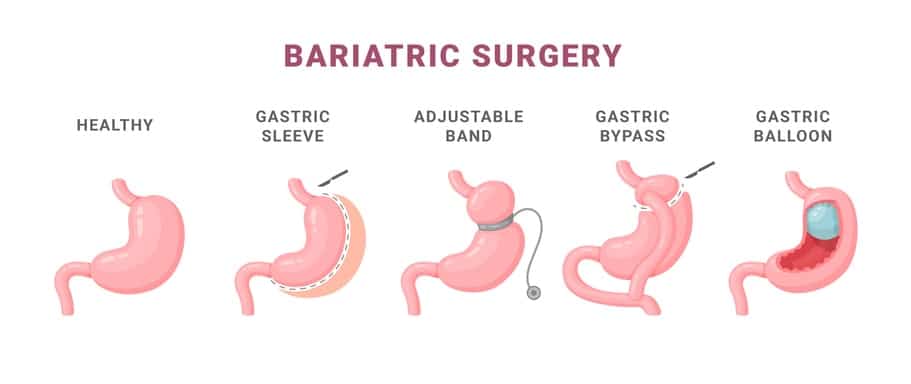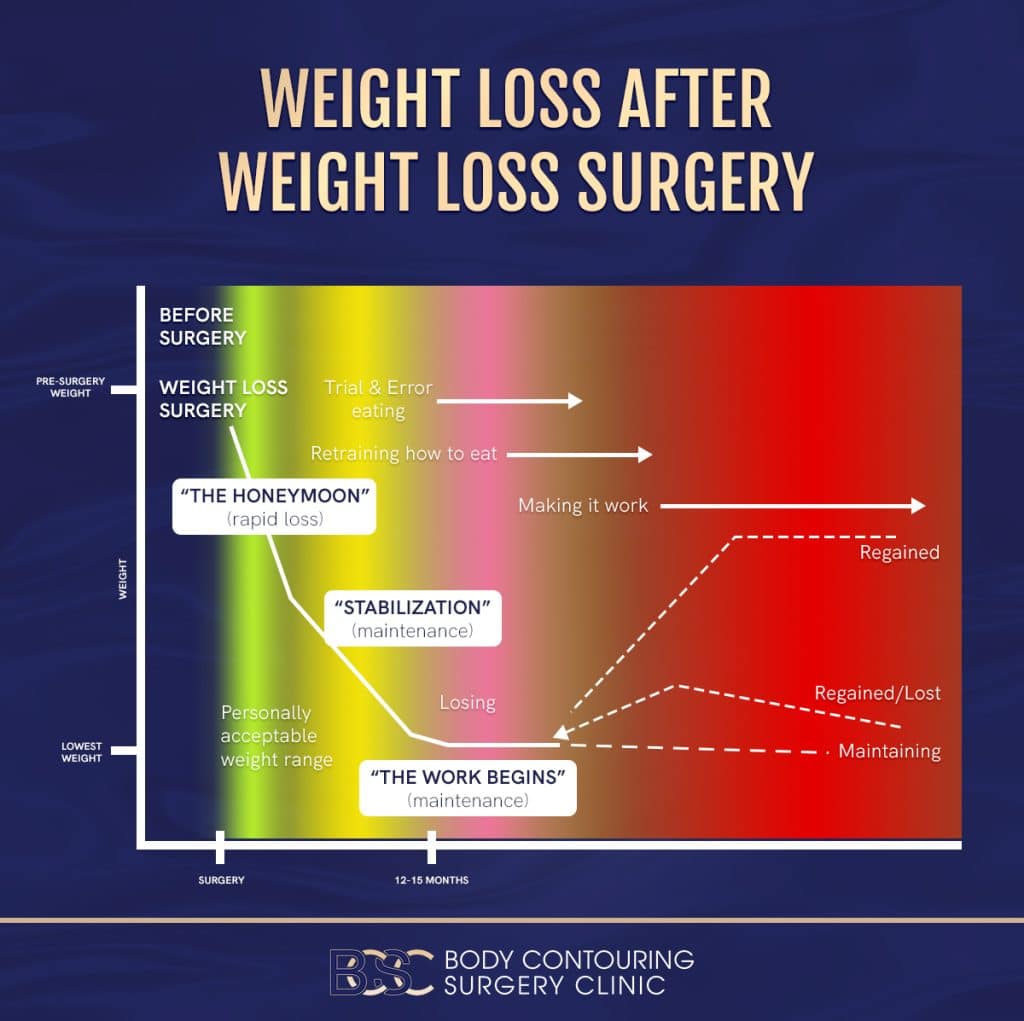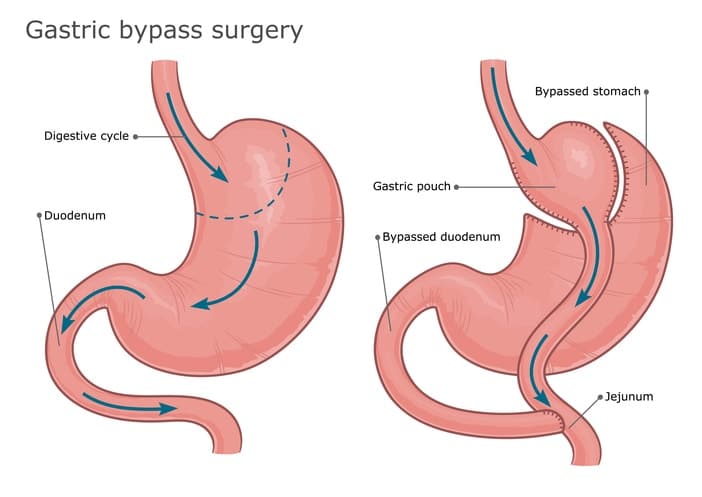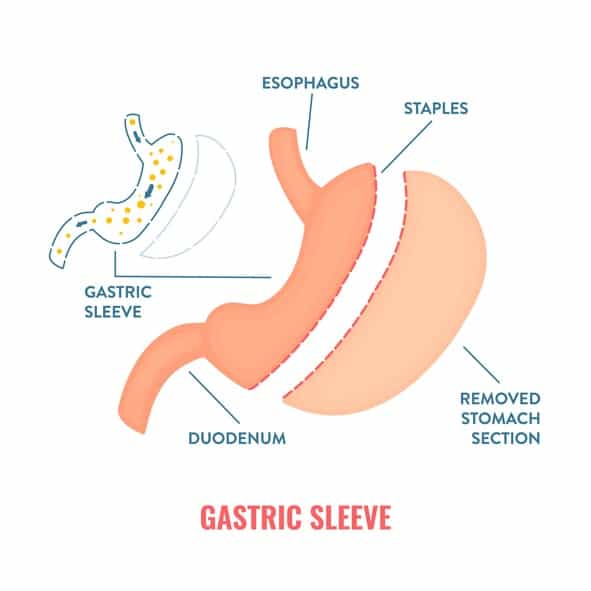
After weight loss surgery, you can expect weight loss followed by a steadier pace. This article covers typical weight loss amounts, diet and lifestyle tips, and how to maintain your weight long-term, focusing on weight loss after weight loss surgery.
Points to remember
- Understanding the stages of weight loss post bariatric surgery is crucial for setting realistic expectations and achieving sustained results.
- Adherence to dietary guidelines and incorporating regular physical activity are essential for the success of weight loss surgery, with particular emphasis on protein intake, hydration, and exercise routines tailored to different recovery stages.
- Psychological support and continuous follow-up care play a vital role in long-term weight maintenance, emotional challenges, nutrient deficiencies, and potential complications such as dumping syndrome.
Understanding Weight Loss Surgery in Australia

Metabolic and bariatric surgery, one of the most common bariatric procedures, is designed to alter the digestive system to aid in weight loss. Its primary purpose is to help patients lose excess weight and reduce the risk of weight-related health problems such as diabetes, hypertension, and sleep apnea. The journey doesn’t end with the surgery; it merely sets the stage for a more active life.
There are several types of bariatric surgery, including Roux-en-Y gastric bypass, sleeve gastrectomy, and biliopancreatic diversion with duodenal switch (BPD/DS). For instance, gastric bypass surgery facilitates weight loss by reducing the size of the stomach and connecting it directly to the small intestine. This modification leads to considerable weight loss and promising long-term results. Each type of surgery has its unique benefits and considerations, and the choice of procedure depends on various factors including the patient’s health profile and weight loss goals.
Post-surgery weight loss expectations can differ greatly among patients. Medical professionals commonly gauge weight loss results using the percentage of excess weight lost (%EWL). Patients typically experience three distinct phases of weight loss following bariatric surgery: an initial weight loss phase, a transition to steady weight loss, and long-term weight maintenance. Understanding these phases helps set realistic expectations and prepares patients for the journey ahead.

A significant number of patients in Australia who undergo bariatric surgery have reported significant results. With careful adherence to medical advice and lifestyle changes, achieving and maintaining significant weight loss is possible. The journey requires commitment and support, but the rewards—a more active life—are well worth the effort.
Your weight loss surgery options in Maitland, NSW Australia

If you’re considering weight loss surgery in Maitland, NSW, Australia, you have several options to choose from. The primary bariatric surgery procedures available include gastric bypass and gastric sleeve. Each of these procedures has different mechanisms and outcomes, so it’s crucial to understand the specifics to make an informed decision.
Gastric bypass surgery, one of the most common weight loss procedures, involves creating a small pouch from the stomach and connecting it directly to the small intestine. This operation restricts food intake and modifies the digestive process, resulting in significant weight loss.
Gastric sleeve surgery, or sleeve gastrectomy, involves removing a large portion of the stomach, leaving a tube-like sleeve. This results in reduced food intake and hormonal changes that promote weight loss.
Maitland’s medical facilities offer experienced surgeons and comprehensive support programs to help patients through every step of their weight loss journey. From pre-surgical consultations to post-surgical care, patients receive the guidance needed to achieve optimal outcomes. Choosing the right procedure and adhering to medical advice can lead to successful long-term weight loss and a healthier lifestyle.

Join Our Free Weight Tracker Today!
Easily track your weight and measurements, and visualize your progress with charts and photos. Sign up for personalized support from our expert team! Start your journey now!
Factors Influencing Weight Loss
Multiple factors influence the weight loss journey following surgery. Some of these factors include:
- Age
- Gender
- Starting weight
- Type of procedure
- Adherence to medical advice
Understanding these factors can help set realistic expectations and tailor a personalized weight loss plan.
Younger patients often experience more substantial weight loss compared to older individuals, primarily due to higher metabolism. Gender also plays a role; studies have shown that males tend to lose more weight in terms of the percentage of excess weight lost (%EWL) compared to females. However, both genders can achieve significant weight loss and excess weight loss with proper adherence to dietary and exercise guidelines.
The starting weight also serves as another pivotal factor. Individuals with a higher starting weight often lose a greater amount of weight after surgery. However, existing medical conditions such as diabetes or hormonal imbalances can impact the rate of weight loss and require specialized management.
Adherence to post-surgery dietary guidelines, exercise, and lifestyle changes significantly influences weight loss outcomes. A comprehensive follow-up program, including regular check-ups with healthcare providers, is crucial for long-term success. By understanding and managing these factors, patients can maximize their weight loss results and maintain a healthier lifestyle.
Initial ** Weight Loss Phase
Many patients find the initial ** weight loss phase both exhilarating and motivating. In the first month after gastric sleeve surgery, most patients lose about 2-3 kilograms per week. This ** weight loss continues for the first three months, during which patients can expect to lose 3 to 7 kilograms per month.
A post-surgical diet, primarily consisting of liquids and pureed foods, aids this phase by significantly limiting caloric intake. The body’s response to the surgery, coupled with the strict dietary regimen, leads to fast weight loss. However, it’s essential to follow medical advice closely to ensure the body gets the necessary nutrients during this period.
After the initial three months, the weight loss rate typically begins to taper off. This transition marks the end of the ** weight loss phase and the beginning of a more gradual, steady weight loss period. While the pace of weight loss slows down, the focus shifts towards:
- Establishing sustainable habits for long-term success
- Maintaining a healthy lifestyle
- Incorporating regular exercise
- Making healthy food choices
- Monitoring portion sizes
- Managing stress levels
- Getting enough sleep
By focusing on these eating habits, you can continue to make progress towards your weight loss goals in a sustainable way.
Transition to Steady Weight Loss
As the ** weight loss phase concludes, patients move into a phase of steady weight loss. This period is crucial for establishing good habits that will support sustained weight loss and maximize recovery. The body may begin to defend against further weight loss by adapting its metabolism and energy stores.
During this phase, the pace of weight loss slows down, which can be beneficial in reducing the risk of excess skin and allowing the body to adapt to new habits. Patients often experience a plateauing phase, where weight loss stalls temporarily. This is a natural part of the process and should not be a cause for concern.

To maintain progress, it’s important to follow a balanced diet and regular exercise routine. Here are some tips to help you continue your weight loss journey:
- Adhere to the dietary guidelines provided by healthcare professionals
- Incorporate physical activity into your daily routine
- Regularly follow up with and seek support from healthcare providers
Following these tips can help you overcome plateaus and continue on your weight loss journey.
By focusing on sustainable habits and being patient with the process, patients can achieve long-term success. This phase is about building a foundation for a healthier lifestyle that will support weight maintenance in the years to come.
Importance of Diet and Nutrition
The success of weight loss surgery hinges significantly on diet and nutrition. After surgery, the diet usually starts with liquids and then advances to pureed and soft foods. Finally, regular foods can be reintroduced as the patient recovers. This gradual progression helps the body adapt to the changes and ensures that patients receive the necessary nutrients for recovery.
Post-operative nutrition care focuses on hydration, nutrient and protein intake, and a gradual return to normal food. Protein intake holds particular importance, with a suggested minimum of 25 grams per day during the initial postoperative phase. As patients progress, the goal is to consume 70 to 100 grams of protein per day, which can be achieved with the help of protein powders and high-protein foods.
Some essential supplements to support the body’s nutritional needs after surgery include:
- Daily multivitamins
- Vitamin D
- Iron
- Calcium
- Vitamin B12
- Zinc
- Magnesium
In addition, it is recommended to take liquid fiber supplements or gentle stool softeners to prevent constipation during the early postoperative phase. Regular follow-ups with a dietitian are also mandatory to ensure optimal nutritional status post-surgery.
By following dietary guidelines and prioritizing nutrition, patients can support their weight loss journey and maintain their health. Proper nutrition is the foundation of long-term success and plays a vital role in achieving and maintaining weight loss goals. Monitoring one’s dietary intake is essential for ensuring the right balance of nutrients and calories for effective weight loss.
Physical Activity and Exercise Habits
Physical activity constitutes a vital element of post-surgery weight loss. Regular exercise helps break weight loss plateaus, maintain progress, and ** overall health. Incorporating physical activity into daily routines is essential for long-term success.
Daily exercise activities recommended after bariatric surgery include:
- Walking
- Simple treadmill or stationary cycle exercise
- Light weights
- Swimming
- Water aerobics
Joining exercise classes like yoga, aerobics, or kickboxing can help diversify physical activity and keep it enjoyable.
During the initial six months, strive for 30 minutes of uninterrupted aerobic activity between three to five days a week. After six months, increase the goal to 45 minutes of continuous aerobic activity at least four days a week. Varying exercise routines, including adding strength training, can assist in breaking through weight loss stalls and preserving lean muscle mass.
Periodic consultations with an exercise specialist or physiotherapist can provide personalized guidance and support. By establishing and maintaining regular exercise habits, patients can ** their weight loss results and ** their overall health and well-being.
Managing Plateaus and Stalls
Following weight loss surgery, experiencing weight loss plateaus is commonplace. A plateau is a period of slowed or halted weight loss after a period of ** weight loss. After gastric sleeve surgery, a plateau often occurs around the three-week mark. Despite following a healthy diet and exercise routine, the body naturally slows down the weight loss process after a few weeks of ** weight loss.
To overcome plateaus, patients should:
- Keep a detailed journal of their diet, weight, and exercise habits to identify any areas for **
- Reassess the diet under a dietitian’s supervision and adjust it to include nutritionally dense foods
- Consistently engage in physical activity
These steps can help you lose weight and break through a weight loss plateau.
Taking regular body measurements with a tape measure can help track progress beyond what is shown on the scale, including changes in body mass index. By staying patient and making necessary adjustments, patients can continue their weight loss journey and achieve their goals.
Long-Term Weight Maintenance
Long-term weight loss maintenance after surgery necessitates continuous follow-up care, lifestyle alterations, and the celebration of milestones. Long-term success after gastric bypass surgery, for example, requires following dietary advice and increasing physical activity. While weight loss results are profound at three years post-surgery, regaining some weight is normal around this time.
Ongoing surgical follow-up care and a comprehensive post-operative follow-up program are essential for maintaining long-term weight loss. Documenting progress through photographs and journaling can help celebrate milestones and successes, providing motivation to stay on track.
Regular exercise and adherence to dietary guidelines are crucial for long-term success. Patients should focus on maintaining a balanced diet and incorporating physical activity into their daily routines to support weight maintenance. By staying committed to their health goals and seeking support when needed, patients can achieve lasting results and enjoy a healthier lifestyle.
Psychological Support and Mental Health
The journey towards weight loss and maintenance extends beyond physical aspects, encompassing substantial emotional and psychological challenges. Many patients undergoing weight loss procedures experience a range of emotions post-surgery, including depression about dietary restrictions and anxiety about new social opportunities. It’s essential to address these feelings to prevent them from hindering progress.
Patients may also face grief from no longer using food to fill emotional voids post-surgery. This transition requires discovering and cultivating ** coping mechanisms to avoid substituting food with other addictive behaviors, such as tobacco and alcohol. Some common self-care tactics that can help maintain mental well-being include:
- Meditation
- Yoga
- Exercise
- Eating clean
- Engaging in enjoyable activities
These practices can help individuals find new ways to cope and fill emotional voids without relying on food.
Building a strong support network is crucial. This can include support groups, counseling, or trusted family members and friends who provide essential emotional support post-surgery. Surrounding oneself with a supportive community can provide motivation and encouragement, especially during weight loss plateaus.
Keeping a journal to track food intake and emotions can help manage emotional challenges after surgery. A positive and determined mindset is crucial for long-term weight maintenance success. By focusing on mental health and seeking support when needed, patients can navigate the emotional aspects of their weight loss journey effectively.

Common Challenges and How to Overcome Them
Post-surgery, patients frequently encounter various challenges that, if not properly **, can impede their success. One of the most significant challenges is nutrient deficiencies, as the altered digestive system may not absorb nutrients effectively. To combat this, patients need to take vitamin and mineral supplements for life, including:
- Multivitamins
- Vitamin D
- Iron
- Calcium
- Vitamin B12
- Zinc
- Magnesium
Another common issue is dumping syndrome, which occurs when food moves too quickly from the stomach to the small intestine. Symptoms can include nausea, vomiting, diarrhea, and abdominal cramps. Managing this condition involves eating smaller, more frequent meals and avoiding high-sugar and high-fat foods.
Weight regain is another potential risk, often preceded by weight gain. Patients must adhere to dietary guidelines, engage in regular physical activity, and attend follow-up appointments to monitor their progress and make necessary adjustments. With the right support and strategies, patients can overcome these challenges and achieve long-term success.
Summary
Achieving and maintaining weight loss after surgery is a complex and ongoing journey that requires dedication, support, and a comprehensive approach. From understanding the phases of weight loss to managing plateaus and ** psychological challenges, each step is crucial for long-term success. By following dietary and exercise guidelines, seeking support, and making sustainable lifestyle changes, patients can achieve their weight loss goals and enjoy a **, more fulfilling life.
Remember, the journey is unique for each individual, and it’s essential to stay motivated and celebrate every milestone along the way. With the right mindset and support, lasting weight loss is within reach.
Frequently Asked Questions
In Australia, the different types of weight loss surgery available include Roux-en-Y gastric bypass, sleeve gastrectomy, and biliopancreatic diversion with duodenal switch (BPD/DS). Each type has its own specific benefits and considerations.
After surgery, patients generally experience initial ** weight loss followed by steady weight loss and long-term maintenance, usually measured as a percentage of excess weight lost. The amount of weight lost varies among individuals.
Age, gender, starting weight, type of procedure, and adherence to medical advice are all influential factors in determining weight loss outcomes after surgery. These factors collectively shape the success of the weight loss journey.
To manage weight loss plateaus, keep a detailed journal of your diet and exercise habits, reassess your diet under a dietitian’s supervision, include nutritionally dense foods, and maintain consistent physical activity.
After weight loss surgery, individuals can receive psychological support through counseling, support groups, and building a strong support network, which are crucial in ** emotional challenges and cultivating ** coping mechanisms.